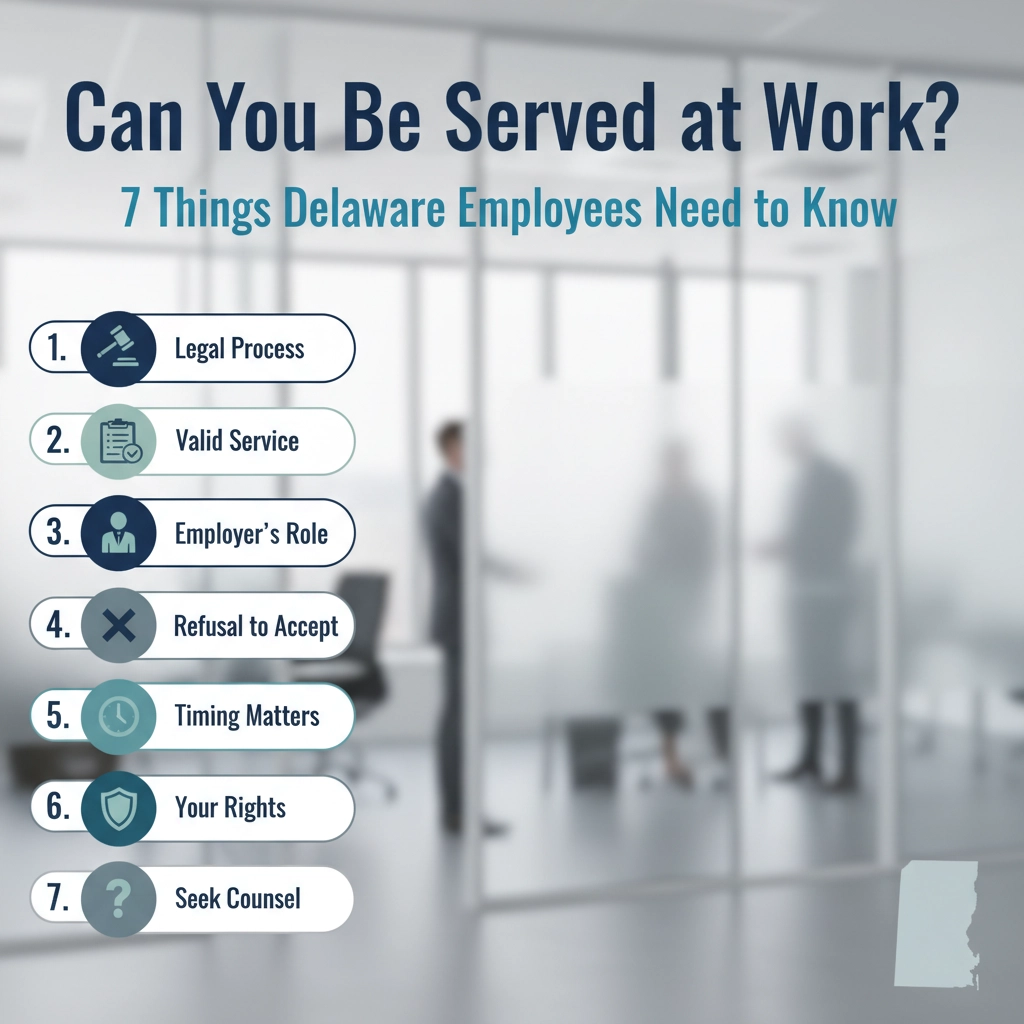Why is skip tracing important?
Why skip tracing is important!
How much are skip tracing fees?
The type of skip tracing service...

Being served legal documents at your workplace can feel overwhelming and embarrassing, but understanding Delaware's service of process laws will help you navigate this situation professionally and protect your legal rights. Delaware employees face unique considerations when legal papers arrive at their job site, from understanding proper procedures to knowing your workplace protections.
Delaware law permits service of legal documents at your workplace, and this practice occurs regularly throughout the state. Process servers and law enforcement officers can legally deliver court papers, summonses, complaints, subpoenas, and other legal documents to your job location during business hours.
Your workplace represents a legitimate location where you can be found and properly served. Delaware courts recognize workplace service as valid, provided the server follows proper procedures and delivers documents directly to you or follows specific alternative service methods outlined in Delaware law.
Understanding this fundamental reality helps you prepare mentally and legally for potential workplace service. Rather than viewing it as an invasion of privacy, recognize workplace service as part of Delaware's legal system designed to ensure you receive proper notice of legal proceedings that affect you.

Delaware law restricts who can serve legal papers at your workplace to specific authorized individuals. Sheriff's deputies represent the most common option, as they possess statewide authority to serve legal documents in any Delaware workplace. These law enforcement officers understand proper service procedures and carry the authority to complete service professionally.
Private process servers also handle workplace service throughout Delaware. These specialized professionals must meet specific state requirements and understand Delaware's service laws thoroughly. Licensed process servers often work more efficiently than sheriff's departments, completing service quickly while maintaining professional standards.
Court clerks may serve papers in certain circumstances, though this occurs less frequently at workplace locations. Some courts authorize specific employees to handle service, particularly for court-generated documents like subpoenas or scheduling orders.
Attorneys cannot serve legal papers in cases where they represent parties, but they may serve documents in unrelated matters. However, most attorneys prefer using professional process servers to avoid potential conflicts and ensure proper service completion.
Delaware employers cannot legally prevent process servers from delivering legal documents to employees at work. Attempting to block service constitutes interference with the legal process, potentially resulting in contempt of court charges or other legal consequences for employers.
Your employer may establish reasonable workplace policies regarding visitor access, security protocols, and employee notification procedures. However, these policies cannot prevent legitimate process servers from completing their legal duties when serving employees with properly authorized documents.
Process servers must identify themselves and their purpose when entering workplace premises. Most professional servers carry identification and can explain their authority to serve legal papers. Your employer should cooperate with this process rather than creating obstacles.
If your employer attempts to prevent service or asks you to avoid accepting legal papers, explain that interference could create legal problems for both the company and you personally. Proper service ensures you receive required notice of legal proceedings, protecting your right to respond appropriately.

Understanding different document types helps you respond appropriately when served at your Delaware workplace. Court summonses represent the most serious category, requiring your appearance in court or formal response within specific timeframes. These documents typically involve lawsuits, divorce proceedings, or other civil litigation matters.
Subpoenas compel your testimony in legal proceedings or require document production. Criminal and civil cases frequently use subpoenas to secure witness testimony or evidence. Delaware law provides certain protections for employees who must comply with subpoenas, including potential workplace attendance accommodations.
Complaints and petitions initiate legal actions against you, requiring formal responses to avoid default judgments. These documents outline specific allegations and provide deadlines for your legal response. Consulting an attorney becomes crucial when receiving complaints or petitions.
Notices and citations inform you of violations, administrative actions, or other legal matters requiring attention. While less urgent than court summonses, these documents still demand careful review and appropriate response within specified timeframes.
Every legal document served at your workplace contains specific response requirements and deadlines that you must meet to protect your interests. Delaware courts strictly enforce these timeframes, and missing deadlines can result in default judgments, fines, or other adverse legal consequences.
Court summonses typically provide 20 days from service to file formal responses, though specific timeframes vary depending on document type and court jurisdiction. Document deadlines begin counting from the service date, not when you read or understand the papers.
Subpoenas often require shorter response times, sometimes demanding appearance within days of service. Delaware law recognizes that workplace service of subpoenas may create scheduling conflicts, but you must still comply or formally request deadline modifications through proper legal channels.
Administrative notices and citations may provide longer response periods but still require attention within specified timeframes. These documents often involve regulatory matters, professional licensing issues, or governmental proceedings that can significantly impact your employment or professional standing.
Document your service date and response deadline immediately upon receiving legal papers. Calculate response timeframes carefully, considering weekends and holidays that may affect filing deadlines under Delaware court rules.

Process servers must complete their legal duties, but professional servers understand workplace dynamics and attempt to minimize disruption during service. Legitimate process servers typically identify themselves discreetly and request private conversations when possible.
Your coworkers may witness the service process, potentially creating workplace gossip or professional concerns. However, process servers cannot disclose specific details about legal matters to non-involved parties, maintaining confidentiality about case specifics.
Consider requesting that the process server step into a private area if possible, though you cannot refuse service based on privacy concerns. Most professional servers accommodate reasonable privacy requests when workplace layout and circumstances permit.
If you anticipate potential workplace service, consider informing your supervisor or human resources department about the possibility. This proactive approach may help minimize workplace disruption and demonstrate your professionalism in handling personal legal matters.
Delaware employment laws provide certain protections for employees involved in legal proceedings, particularly those related to criminal matters or workplace discrimination. Understanding these protections helps you navigate potential workplace concerns resulting from legal document service.
Read the documents immediately and carefully, identifying document type, response requirements, and critical deadlines. Legal papers contain vital information about your rights and obligations, requiring thorough review to understand the situation fully.
Document the service details, including date, time, location, and process server information. This documentation may prove important if service procedures become disputed later in legal proceedings.
Calculate response deadlines accurately, considering Delaware court rules regarding timeframe calculations. Mark critical dates on your calendar and set reminders to ensure you meet all required deadlines.
Consult with a qualified Delaware attorney as soon as possible after being served. Legal counsel can explain your rights, review response options, and help you navigate complex legal procedures effectively. Many attorneys offer initial consultations to help you understand your situation and available options.
Notify relevant parties if the legal matter affects your work schedule, requires court appearances, or involves workplace-related issues. Your employer may need advance notice of potential scheduling conflicts, particularly if you must comply with subpoenas or attend court proceedings.
Maintain professionalism throughout this process, recognizing that workplace service represents a normal part of Delaware's legal system rather than a personal failure or embarrassment.
For professional assistance with process service matters or questions about Delaware's service of process requirements, contact experienced legal professionals who understand state-specific procedures and can provide guidance tailored to your situation. Proper handling of legal document service protects your rights and ensures compliance with Delaware law requirements.
Why skip tracing is important!
The type of skip tracing service...
Learn how to serve court papers to someone in Delaware with this comprehensive step-by-step guide....
Discover the significance of having a notarized affidavit of residency and how it can provide legal...